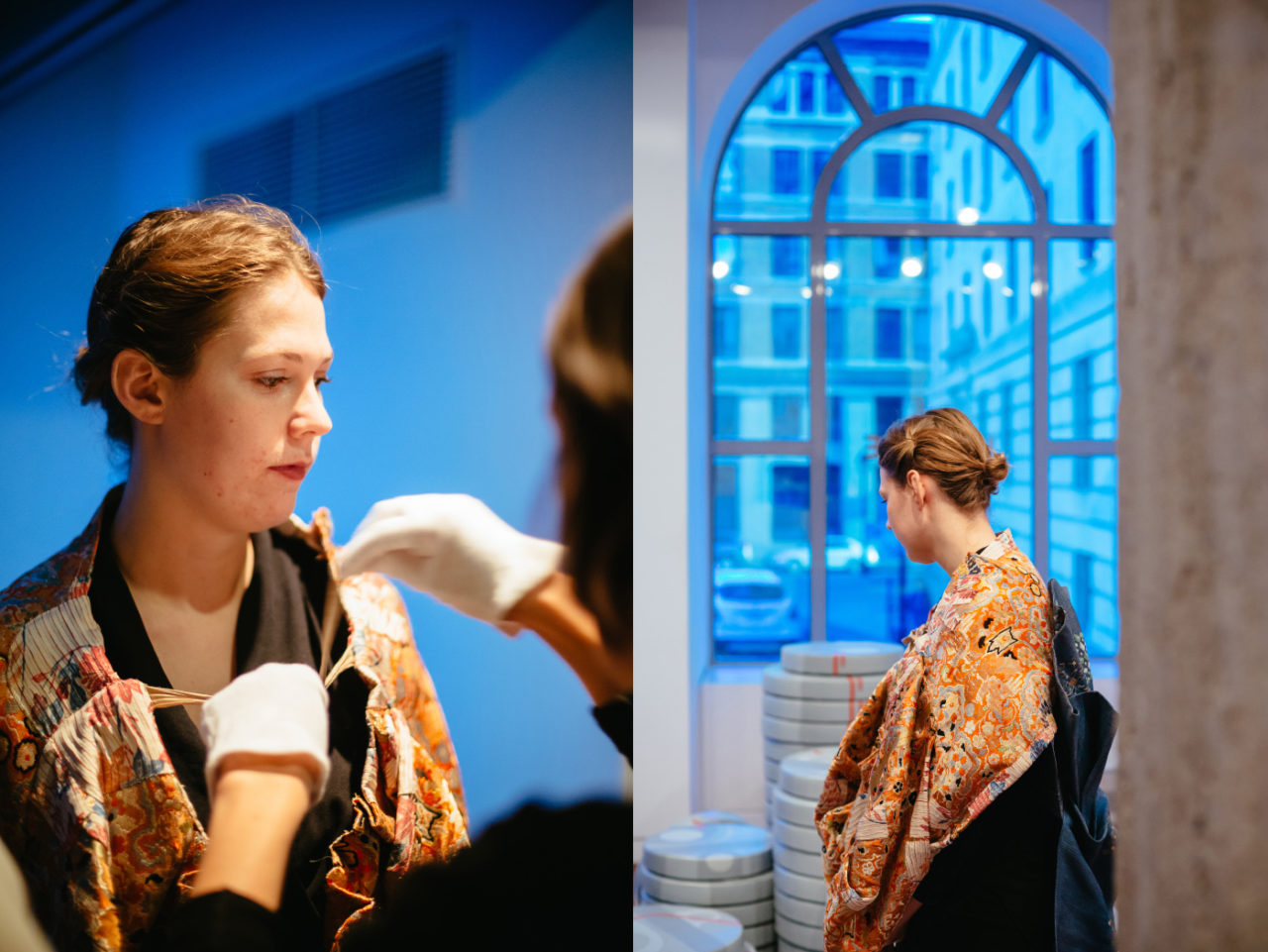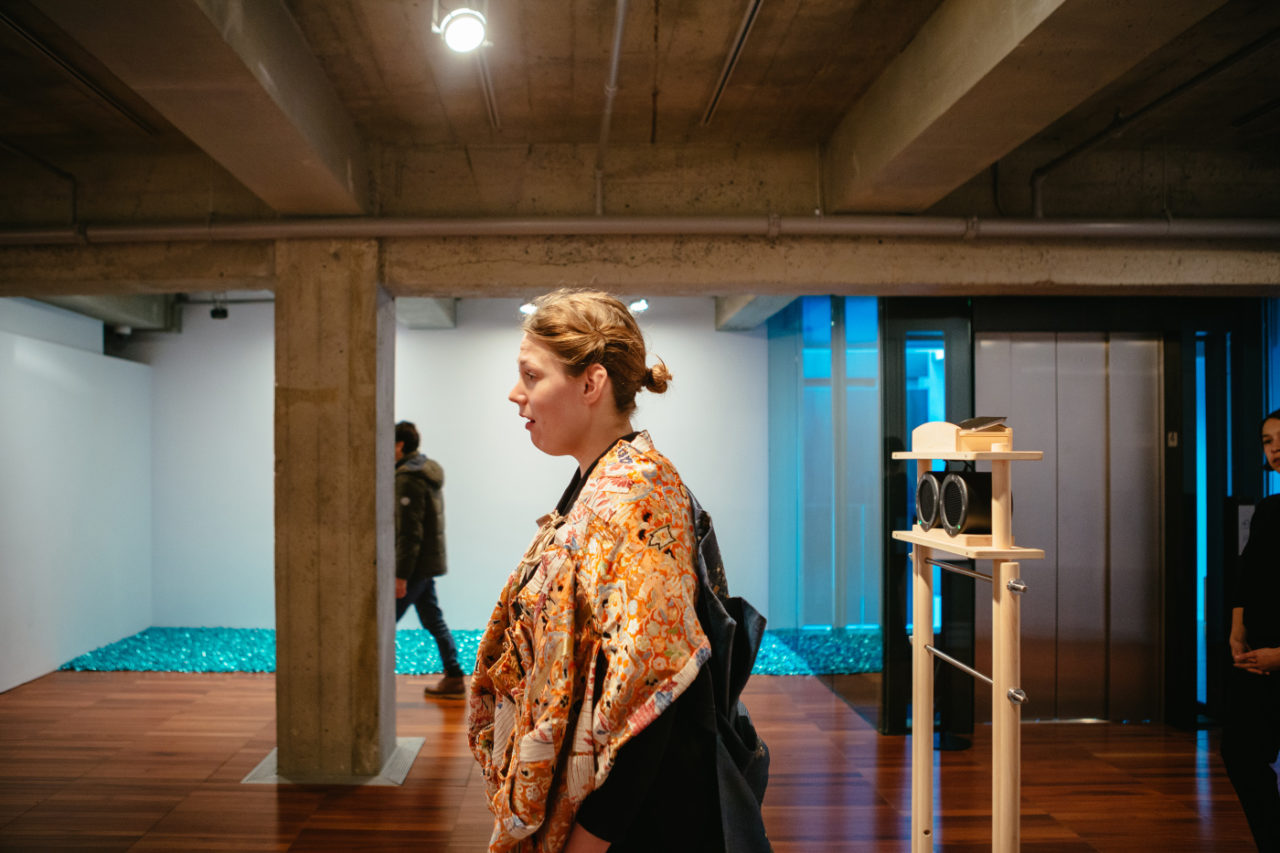The Voices Behind Sonic Blossom: Brittany Rae
The Voices Behind Sonic Blossom: Brittany Rae
Sonic Blossom, created in 2013 after the artist’s mother underwent an invasive surgery, explores the connection between two beings, and how that relationship can be altered by the offering of a transformational gift. The ephemeral quality of the work creates an opportunity for the viewers and the receiver to acknowledge the beauty in something so short and sweet, and serves as a reminder to live life with that same perspective.
My name is Anna Sadofsky, and I have been working at DHC/ART since August 2016. For the exhibition L’OFFRE, I act as a caretaker for the singers in Sonic Blossom by Lee Mingwei. My participation in this piece allows for the singer to maintain a position of a demigod, acting as somewhat of a buffer between the singer and the recipient. I have been fortunate enough to witness and experience the power of the performance firsthand, and have engaged in conversations with all of the singers to reflect on this magical piece. Each singer has answered a selection of questions in an interview format about the show and their encounters, while explaining why this piece has become so special and will leave a lasting impression in their lives.

As performing is a continuous aspect of your life outside of the position of demigod in the Sonic Blossom piece, the process of preparing for a role is something of familiarity. What does your routine prior to each Sonic Blossom performance consist of, and how does it vary from roles you’ve explored in past productions?
Brittany Rae: The approach is different in the way that I'm usually preparing for an opera, and in an Opera the character and story stay the same. As a demigod, the environment around you is always changing; the people, the vibe of the space, and the space itself when offering the gift. There are more controlled factors in my past roles, so I consider that when I mentally prepare for Sonic Blossom. I always take time to vocally prepare, that’s important, but singing for Sonic Blossom feels different than a performance, especially the more I do it because there's just more flexibility and requires me to open myself. When I'm not mentally in the space to give as much it becomes harder, so being patient and mentally preparing for the possibilities is the most important for me.
The Transformation Cloak worn for each presentation introduces a variety of inquiries by the visitors, both on its visible beauty and its importance to the overall piece. How has the costume come to play a part in your characterization of this role? At this point in the show, do you feel presenting the gift sans-robe would affect your performance?
BR: I definitely think there would be something missing if I wasn't wearing it, the words that come to my mind right away are the aura of mystery and suspense it generates, if it wasn't as beautiful to look at maybe it would be easier to consider not wearing it. It being so beautiful really grabs the attention of the receiver as they receive a (hopefully) beautiful gift. It feels heavy, but I love that because it centers me, and the little moment right before I sing I find it grounds me. Maybe that was Lee Mingwei’s intention, but I really love that aspect of it, feeling solid.
Many visitors are unaware of the emotionally charged backstory that spurred the creation of this piece prior to receiving the gift. Do you find the responses of the visitors change in any way once they’re informed of the origin of the work
BR: That’s a hard one, I can't think of many instances where even after explaining the origin - I don’t know if I’ve told many people, actually. I don't think it really changes the way you interact with the gift, it's always cool to know the backstory but I don't think that it changes the impact of it.
You’ve encountered visitors who have backgrounds in music, singing, or a familiarity with the German language. How does the exchange differ, if at all, when the receiver is familiar with the aforementioned attributes, in comparison to visitors with no experience in those fields?
BR: I’ve had a couple receivers who were familiar with German, and I noticed that there's a heightened sense because they’re understanding the words, but I don't feel like it’s strongly changed anything, maybe just increased the level of attention. With people who have a background in music or song, they usually comment on being classically trained or knowing someone who is classically trained. They’re more accustomed to hearing the human voice but they also have a greater appreciation for it as their ears and minds are ready to accept the sound. For people who aren’t familiar with music in the same way, the willingness comes a bit slower. There’s a worry that they’ll have to perform or participate and that timidness isn't as present with people in the field.
The spontaneity of the offering often catches visitors off guard, and frequently leads to a beautiful and emotional exchange, somewhat led by the innocence of the receiver. Due to the uninhibited reaction of the receiver, you’ve surely encountered a variety of responses once the piece is finished. From facial expressions to verbal exchanges, are there any moments or comments that have aided in shaping this experience that you’d like to touch on?
BR: Choosing someone and the spontaneity, there's a temptation to choose a random person but I try to pace myself and feel the energies of people around me, and observe them as opposed to trying to fill a quota. Them not knowing what to expect, trusting that as the giver it can be stressful in the moment, it teaches me and them to just trust more, which is clearly lacking in the world. That's what's interesting about this project, accepting the intimacy between strangers. The most exciting thing is beyond the physical responses, but the most telling moment is the change in people's eyes once the song starts, it's so subtle and minute but once that light turns on, that’s really magical, that moment.
Each of you have been given a selection of Schubert’s Lieders to offer as a gift. I’m curious as to the thought process behind choosing the song you’re going to sing in the moment; is it somewhat random? Or have each of the songs acquired a particular meaning to you that comes into play when you’re choosing which one to perform?
BR: I’d say there's one song, for me, that I love singing more than the rest, and I find that if I’m excited about the gift im going to give that will transfer into the performance. I love singing all of them, but Du bist die Ruh and Nacht und Traume just give me that extra excitement. They have different qualities that make it somewhat easy for me, but the ease is also from the excitement I feel when singing them. Vocally, they’re my favourite. But sometimes, I go into the performance thinking I’m going to sing one song, and then at the last moment I change my mind because of my interaction with the person and their vibes. And sometimes it's because I haven't sung one in a while and I want to change it up.

Anna Sadofsky
DHC/ART
Photos: Marc-Olivier Bécotte